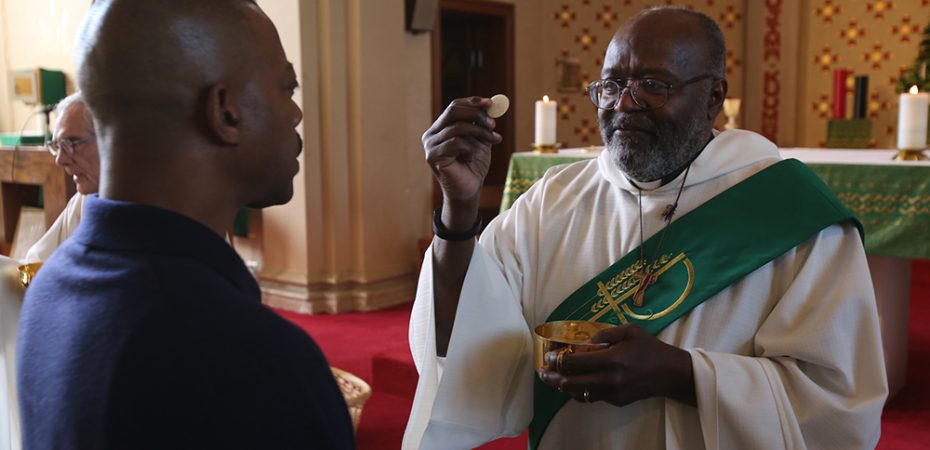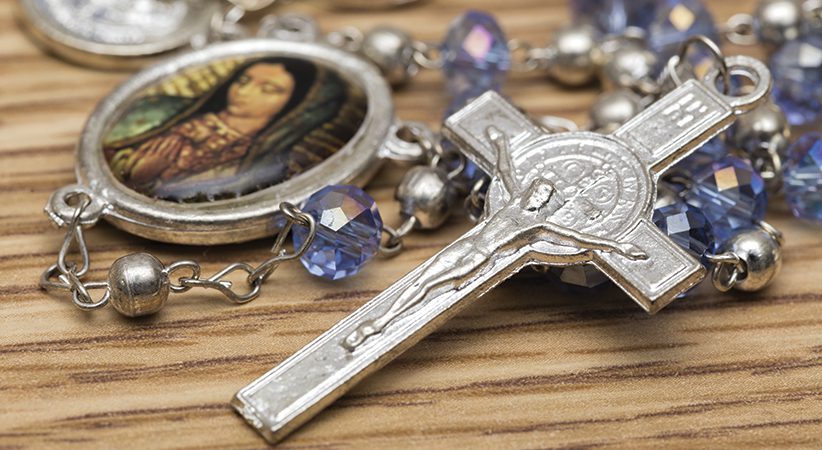Context is Everything: The Deacon and the Distribution of the Host
Deacon Dominic Cerrato 2
A Canadian minister once said that “a text without context is pretext.” This is to say that a quote, removed from its wider setting, can distort the original intent of the author. Presumed here is that the context in which the quote occurs always contributes to its meaning. This is true of most things. Thus, a word has no contextual meaning outside a sentence, a sentence has no contextual meaning outside a paragraph, and a paragraph has no contextual meaning outside a chapter. The same is true of our treatment of the sacred Scriptures and magisterial documents. To cherry-pick a phrase without grasping its broader theological context can, and often does, lead to distortion and confusion.
One such distortion resulting from a lack of context is the deacon’s role in the distribution of Communion. According to the General Instruction to the Roman Missal (GIRM), “If communion is given under both kinds, the deacon himself administers the chalice to the communicants” (No. 182). This is reiterated in USCCB’s document, Norms for the Distribution and Reception of Holy Communion under Both Kinds in the Dioceses of the United States of America.
When I first read these sources many years ago, it struck me as quite odd as such an apparent restriction would accord to an extraordinary minister a greater breath of ministry than an ordinary minister in the distribution of the Eucharist. It would suggest that the day before his ordination, the deacon could distribute the sacred Host, while the day of his ordination, and indeed every day of his life thereafter, he may only distribute the Precious Blood. Can this really be the case or are we missing some sort of contextual framework?
To begin to develop this framework, it’s important at the outset to recognize a fundamental truth. The minister who distributes the sacred host, and the minister who distributes the precious blood, exercise the very same ministry. This is because Jesus Christ is equally present, really present, in both species, body, blood, soul and divinity (see Catechism of the Catholic Church, Nos. 1374-1376). This is known as the doctrine of concomitance. As a result, with there being no substantial difference, it logically follows that the deacon, who has by virtue of his ordination the ministry of distributing the Eucharist, may distribute under both species.
Yet, we are still faced with ambiguity regarding GIRM No. 182. This ambiguity is not so much in the text itself which seems quite clear, but how that text is interpreted in light of the liturgical and theological tradition. Put in the form of a question, how can this seeming contradiction between the liturgical rubrics on one hand, and the doctrine of concomitance along with the distinction of being an ordinary minister on the other, be reconciled? It seemed to me that I was missing some sort of contextual framework.
Since this necessary framework impacts the practice of the whole Church in the distribution of holy Communion, that context needs to come from an authoritative source. Theological argumentation, no matter how grounded in the sources of revelation, no matter how cogent in its writing, cannot resolve the issue on its own. Since this practice of deacons distributing the sacred host varies from diocese to diocese (indicating a broad interpretation), and since it concerns the original intent of GIRM No. 182, no one bishop could answer for the universal Church. To clear up the ambiguity, it would be necessary to go to the source, to the Congregation for Divine Worship and the Discipline of the Sacraments.
While researching my book, I grappled with this very issue. Entitled “In the Person of Christ the Servant,” the publication examined how an impoverished theological understanding of the diaconate led to many inconsistent pastoral practices. I believed that this is particularly true of some diocese who explicitly forbid the deacon to distribute the Sacred Host undermining both concomitance and the role of ordinary Eucharistic ministers.
To resolve this dilemma and acting as a private theologian, in 2009 I sent a dubium to Cardinal Antonio Llovera, prefect of the Congregation for Divine Worship and the Discipline of the Sacraments, which stated:
“In accordance with GIRM 182, ‘If Communion is given under both kids, the deacon himself administers the chalice to the communicant.’ Is it the intention of the Missale Romanum to forbid the practice of deacons distributing the sacred host when both species are distributed and when there are a number of extraordinary ministers distributing the sacred host?”
A response came back in less than six weeks (an unheard-of response time for Rome) through the office of the then apostolic nuncio, Archbishop Pietro Sambi, with his complements. The letter read, in part:
“The Code of Canon Law stipulates that the “ordinary minister of Holy Communion is a bishop, priest or deacon (Canon 910.1). When a deacon is present at the celebration of Holy Mass, he should exercise his ministry, which includes, among other things, assisting the priest celebrant in the distribution of Communion.
The passage noted in your letter, indicating that, ‘if Communion is given under both kids, the deacon administers the chalice to the communicants’ (GIRM, No. 182), can certainly not be interpreted in the sense of prohibiting the deacon from distributing the sacred host when, in addition to ordinary ministers of Communion, there should be a need for extraordinary ministers to distribute the sacrament to the faithful.”
While the response by the undersecretary did not resolve the ambiguity in the sense that we know why GIRM No. 182 is stated the way it’s stated, we do know that it was never meant to exclude deacons from the distribution of the sacred host. Here, the text has definitive context and thus the original intent is revealed by the only authoritative source that could reveal it. This means that, if the pastoral practice is to authentically follow GIRM No. 182 as intended by the congregation charged with writing and interpreting the liturgical discipline, deacons cannot be forbidden to exercise their ministry of distributing the sacred host.
DEACON DOMINIC CERRATO, Ph.D., is editor of Deacon Digest and the director of diaconal formation for the Diocese of Joliet, Illinois. He is founder of Diaconal Ministries, where he gives national presentations and retreats to deacons and diaconal candidates. Follow him on Facebook to continue the conversation.






Comments are closed.